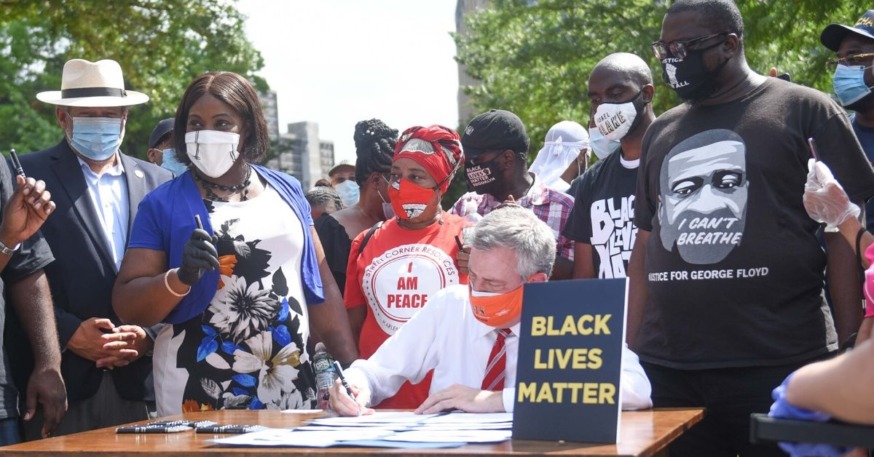
Michael Appleton/Mayoral Photography Office
July 16, 2020 By Michael Dorgan
The mayor signed a package of police reform bills into law Wednesday that aim to combat police brutality and encourage greater police accountability.
The legislation takes aim at police misconduct by banning cops from using chokeholds in all situations as well as making police records more accessible to the public.
The reform bills, called the NYPD Accountability Package, make police disciplinary records and the NYPD’s use of surveillance technologies more transparent. They also require cops to have their shield number and rank designations visible at all times and protect the right of citizens to record the police.
One of the bills requires the department to maintain a centralized system that is used to record, track, review, and evaluate officer activity and to identify officers who may be in need of enhanced training, monitoring, or reassignment.
The legislation was passed by city council last month to help foster trust between police and the general public following weeks of protests and demands for police reform.
The mayor said that the legislation will expand accountability within the NYPD and transform policing across the city.
“I’m confident we can make these reforms work and continue strengthening the bond between police officers and our communities,” the mayor said while signing the legislation in the Bronx. De Blasio had joined activists to help paint “Black Lives Matter” along Morris Avenue shortly beforehand.
The move to ban chokeholds has drawn criticism from top police officials who say the law goes too far and prevents cops from doing their jobs effectively.
The legislation goes further than strictly banning chokeholds; it also prohibits cops from sitting, kneeling or standing on a suspect’s chest and back during an arrest.
NYPD Police Commissioner Dermot Shea has brandished the bill as “insane” while NYPD Chief of Department Terence Monahan previously said that a ban on maneuvers that press against a suspect’s diaphragm would be dangerous for police.
“Any cop who’s ever fought with someone on the street, trying to get him into cuffs, there’s a great possibility that your knee is going to end up on that individual’s back, and now this new law is criminalizing it,” Monahan said last week the New York Post reported
De Blasio acknowledged police concerns Wednesday but said that the city can make the law work.
Queens Council Member Rory Lancman, who introduced the anti-chokehold bill to city council, tweeted that the new reforms will “ensure police conduct themselves in ways that shows Black Lives Matter.”
